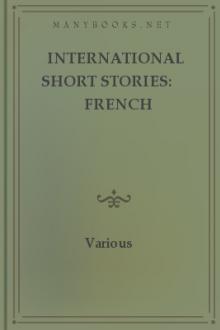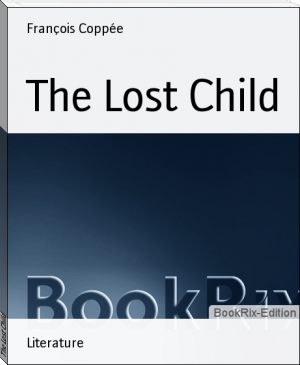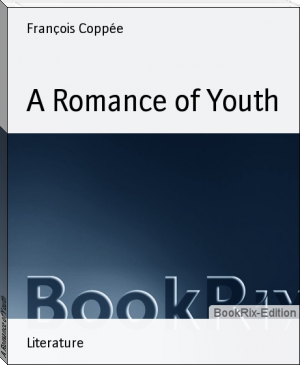International Short Stories: French - - (new books to read .TXT) 📗

- Author: -
- Performer: -
Book online «International Short Stories: French - - (new books to read .TXT) 📗». Author -
The time now arrived for celebrating a grand festival, which returned every five years. It was a custom in Babylon solemnly to declare at the end of every five years which of the citizens had performed the most generous action. The grandees and the magi were the judges. The first satrap, who was charged with the government of the city, published the most noble actions that had passed under his administration. The competition was decided by votes; and the king pronounced the sentence. People came to this solemnity from the extremities of the earth. The conqueror received from the monarch’s hand a golden cup adorned with precious stones, his majesty at the same time making him this compliment:
“Receive this reward of thy generosity, and may the gods grant me many subjects like to thee.”
This memorable day being come, the king appeared on his throne, surrounded by the grandees, the magi, and the deputies of all nations that came to these games, where glory was acquired not by the swiftness of horses, nor by strength of body, but by virtue. The first satrap recited, with an audible voice, such actions as might entitle the authors of them to this invaluable prize. He did not mention the greatness of soul with which Zadig had restored the envious man his fortune, because it was not judged to be an action worthy of disputing the prize.
He first presented a judge who, having made a citizen lose a considerable cause by a mistake, for which, after all, he was not accountable, had given him the whole of his own estate, which was just equal to what the other had lost.
He next produced a young man who, being desperately in love with a lady whom he was going to marry, had yielded her up to his friend, whose passion for her had almost brought him to the brink of the grave, and at the same time had given him the lady’s fortune.
He afterwards produced a soldier who, in the wars of Hircania, had given a still more noble instance of generosity. A party of the enemy having seized his mistress, he fought in her defense with great intrepidity. At that very instant he was informed that another party, at the distance of a few paces, were carrying off his mother; he therefore left his mistress with tears in his eyes and flew to the assistance of his mother. At last he returned to the dear object of his love and found her expiring. He was just going to plunge his sword in his own bosom; but his mother remonstrating against such a desperate deed, and telling him that he was the only support of her life, he had the courage to endure to live.
The judges were inclined to give the prize to the soldier. But the king took up the discourse and said: “The action of the soldier, and those of the other two, are doubtless very great, but they have nothing in them surprising. Yesterday Zadig performed an action that filled me with wonder. I had a few days before disgraced Coreb, my minister and favorite. I complained of him in the most violent and bitter terms; all my courtiers assured me that I was too gentle and seemed to vie with each other in speaking ill of Coreb. I asked Zadig what he thought of him, and he had the courage to commend him. I have read in our histories of many people who have atoned for an error by the surrender of their fortune; who have resigned a mistress; or preferred a mother to the object of their affection; but never before did I hear of a courtier who spoke favorably of a disgraced minister that labored under the displeasure of his sovereign. I give to each of those whose generous actions have been now recited twenty thousand pieces of gold; but the cup I give to Zadig.”
“May it please your majesty,” said Zadig, “thyself alone deservest the cup; thou hast performed an action of all others the most uncommon and meritorious, since, notwithstanding thy being a powerful king, thou wast not offended at thy slave when he presumed to oppose thy passion.” The king and Zadig were equally the object of admiration. The judge, who had given his estate to his client; the lover, who had resigned his mistress to a friend; and the soldier, who had preferred the safety of his mother to that of his mistress, received the king’s presents and saw their names enrolled in the catalogue of generous men. Zadig had the cup, and the king acquired the reputation of a good prince, which he did not long enjoy. The day was celebrated by feasts that lasted longer than the law enjoined; and the memory of it is still preserved in Asia. Zadig said, “Now I am happy at last;” but he found himself fatally deceived.
THE MINISTERThe king had lost his first minister and chose Zadig to supply his place. All the ladies in Babylon applauded the choice; for since the foundation of the empire there had never been such a young minister. But all the courtiers were filled with jealousy and vexation. The envious man in particular was troubled with a spitting of blood and a prodigious inflammation in his nose. Zadig, having thanked the king and queen for their goodness, went likewise to thank the parrot. “Beautiful bird,” said he, “‘tis thou that hast saved my life and made me first minister. The queen’s spaniel and the king’s horse did me a great deal of mischief; but thou hast done me much good. Upon such slender threads as these do the fates of mortals hang! But,” added he, “this happiness perhaps will vanish very soon.”
“Soon,” replied the parrot.
Zadig was somewhat startled at this word. But as he was a good natural philosopher and did not believe parrots to be prophets, he quickly recovered his spirits and resolved to execute his duty to the best of his power.
He made everyone feel the sacred authority of the laws, but no one felt the weight of his dignity. He never checked the deliberation of the diran; and every vizier might give his opinion without the fear of incurring the minister’s displeasure. When he gave judgment, it was not he that gave it, it was the law; the rigor of which, however, whenever it was too severe, he always took care to soften; and when laws were wanting, the equity of his decisions was such as might easily have made them pass for those of Zoroaster. It is to him that the nations are indebted for this grand principle, to wit, that it is better to run the risk of sparing the guilty than to condemn the innocent. He imagined that laws were made as well to secure the people from the suffering of injuries as to restrain them from the commission of crimes. His chief talent consisted in discovering the truth, which all men seek to obscure.
This great talent he put in practice from the very beginning of his administration. A famous merchant of Babylon, who died in the Indies, divided his estate equally between his two sons, after having disposed of their sister in marriage, and left a present of thirty thousand pieces of gold to that son who should be found to have loved him best. The eldest raised a tomb to his memory; the youngest increased his sister’s portion, by giving her part of his inheritance. Everyone said that the eldest son loved his father best, and the youngest his sister; and that the thirty thousand pieces belonged to the eldest.
Zadig sent for both of them, the one after the other. To the eldest he said: “Thy father is not dead; he is recovered of his last illness, and is returning to Babylon,” “God be praised,” replied the young man; “but his tomb cost me a considerable sum.” Zadig afterwards said the same to the youngest. “God be praised,” said he, “I will go and restore to my father all that I have; but I could wish that he would leave my sister what I have given her.” “Thou shalt restore nothing,” replied Zadig, “and thou shalt have the thirty thousand pieces, for thou art the son who loves his father best.”
THE DISPUTES AND THE AUDIENCESIn this manner he daily discovered the subtilty of his genius and the goodness of his heart. The people at once admired and loved him. He passed for the happiest man in the world. The whole empire resounded with his name. All the ladies ogled him. All the men praised him for his justice. The learned regarded him as an oracle; and even the priests confessed that he knew more than the old archmage Yebor. They were now so far from prosecuting him on account of the griffin, that they believed nothing but what he thought credible.
There had reigned in Babylon, for the space of fifteen hundred years, a violent contest that had divided the empire into two sects. The one pretended that they ought to enter the temple of Mitra with the left foot foremost; the other held this custom in detestation and always entered with the right foot first. The people waited with great impatience for the day on which the solemn feast of the sacred fire was to be celebrated, to see which sect Zadig would favor. All the world had their eyes fixed on his two feet, and the whole city was in the utmost suspense and perturbation. Zadig jumped into the temple with his feet joined together, and afterwards proved, in an eloquent discourse, that the Sovereign of heaven and earth, who accepted not the persons of men, makes no distinction between the right and left foot. The envious man and his wife alleged that his discourse was not figurative enough, and that he did not make the rocks and mountains to dance with sufficient agility.
“He is dry.” said they, “and void of genius: he does not make the flea to fly, and stars to fall, nor the sun to melt wax; he has not the true Oriental style.” Zadig contented himself with having the style of reason. All the world favored him, not because he was in the right road or followed the dictates of reason, or was a man of real merit, but because he was prime vizier.
He terminated with the same happy address the grand difference between the white and the black magi. The former maintained that it was the height of impiety to pray to God with the face turned toward the east in winter; the latter asserted that God abhorred the prayers of those who turned toward the west in summer. Zadig decreed that every man should be allowed to turn as he pleased.
Thus he found out the happy secret of finishing all affairs, whether of a private or a public nature, in the morning. The rest of the day he employed in superintending and promoting the embellishments of Babylon. He exhibited tragedies that drew tears from the eyes of the spectators, and comedies that shook their sides with laughter; a custom which had long been disused, and which his good taste now induced him to revive. He never affected to be more knowing in the polite arts than the artists themselves; he encouraged them by rewards and honors, and was never jealous of their talents. In the evening the king was highly entertained with his conversation, and the queen still more. “Great minister!” said the king. “Amiable minister!” said the queen; and both of them added, “It would have been a great loss to the state had such a man been hanged.”
Never was a man in power obliged to give so many audiences to the ladies. Most of them came to consult him





Comments (0)